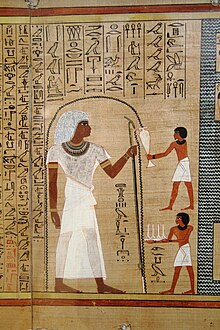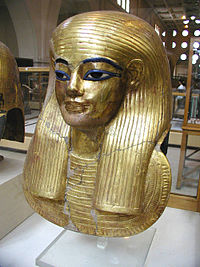Juja (Egyptian)
| Juja in hieroglyphics | ||||||||
|---|---|---|---|---|---|---|---|---|
Juja Jwj3 |
||||||||
| Mummy mask of juja | ||||||||

Juja was a high-ranking ancient Egyptian official in the 18th Dynasty ( New Kingdom ). He was the father-in-law of King ( Pharaoh ) Amenophis III. from about 1388 to about 1351 BC. Ruled (after Helck 1379-1340, after Krauss 1390-1353 BC).
Family and title
The spelling of his name varies on his monuments, between Jau, Jaa, Yuja, Jay or Iay to name just a few examples. His wife was called Tuja . Her daughter Teje was the " Great Royal Wife " of Amenophis III. and mother of Akhenaten . Aanen , one of his sons, was the "second priest of Amun ". Juja carried a number of important titles , such as "Father of God", "Priest of Min " and "Overseer of the horses", and "Chief of the cattle of Min, the Lord of Achmim". He also carried the high rankings of “member of the elite” ( Iripat ), “foremost in action” ( Hatia ), “royal sealer” and “only friend”. As his titles suggest, he probably came from Akhmim .
Grave complex
Juja and his wife Tuja were buried in a rock grave ( KV46 ) in the Valley of the Kings , a great honor for a middle-class couple. The grave was only partially robbed and was found by James Edward Quibell in 1905 .
It still contained the couple's partly gilded coffins, numerous pieces of furniture, their book of the dead and other important objects from a rich burial of that time. Most of the finds are now in the Egyptian Museum in Cairo .
literature
- Theodore M. Davis : The Tomb of Iouiya and Touiyou. London 1907 (reprint London 2000)
- Theodore M. Davis: The Funeral Papyrus of Iouiya. London 1908 (reprint London 2000)
- Wolfgang Helck , in Lexikon der Ägyptologie , Volume 3: Horhekenu - Megeb. 1980, ISBN 3-447-02100-4 , column 274-275.
Individual evidence
- ^ Davis: The Tomb of Iouiya and Touiyou , pp. XIII-XIV
- ^ Davis: The Tomb of Iouiya and Touiyou , pp. XXIV-XV
| personal data | |
|---|---|
| SURNAME | Juja |
| BRIEF DESCRIPTION | Father-in-law of the ancient Egyptian king Amenophis III. |
| DATE OF BIRTH | 15th century BC Chr. |
| DATE OF DEATH | 14th century BC Chr. |
